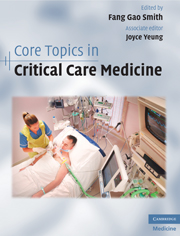
- Cited by 2
-
Cited byCrossref Citations
This Book has been cited by the following publications. This list is generated based on data provided by Crossref.
Bahraseman, Hamidreza Ghasemi Hassani, Kamran Navidbakhsh, Mahdi Espino, Daniel M. Sani, Zahra Alizadeh and Fatouraee, Nasser 2014. Effect of exercise on blood flow through the aortic valve: a combined clinical and numerical study. Computer Methods in Biomechanics and Biomedical Engineering, Vol. 17, Issue. 16, p. 1821.
2016. Rapid Perioperative Care. p. 431.
- Publisher:
- Cambridge University Press
- Online publication date:
- July 2010
- Print publication year:
- 2010
- Online ISBN:
- 9780511712289


